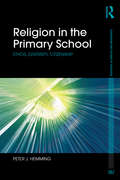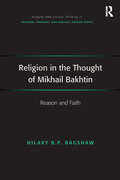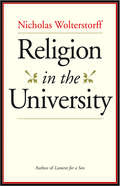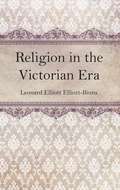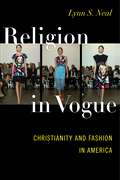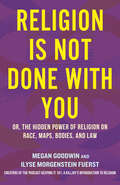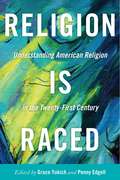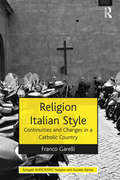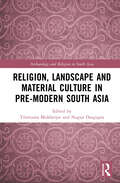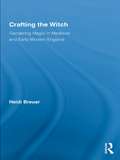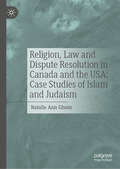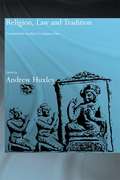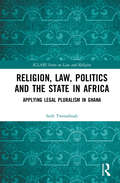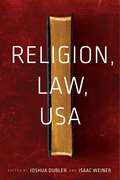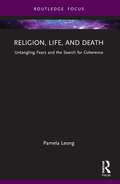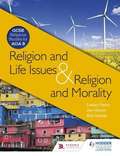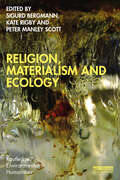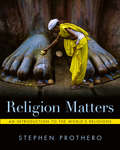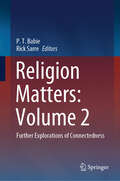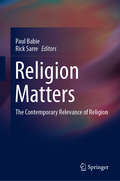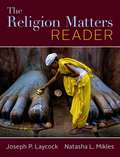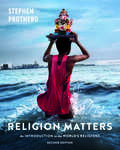- Table View
- List View
Religion in the Primary School: Ethos, diversity, citizenship (Foundations and Futures of Education)
by Peter HemmingReligion and its relationship to schooling is an issue that has become more and more topical in recent years. In many countries, developments such as the diversification of state school sectors, concerns about social cohesion between ethnic and religious groups, and debates about national identity and values have raised old and new questions about the role of religion in education. Whilst the significance of this issue has been reflected in renewed interest from the academic community, much of this work has continued to be based around theoretical or pedagogical debates and stances, rather than evidence-based empirical research. This book aims to address this gap by exploring the social and political role of religion in the context of the primary school. Drawing on original ethnographic research with a child-centred orientation, comparisons are drawn between Community and Roman Catholic primary schools situated within a multi-faith urban area in the UK. In doing so, the study explores a number of ways in which religion has the potential to contribute to everyday school life, including through school ethos and values, inter-pupil relations, community cohesion and social identity and difference. At the centre of the analysis are two key sociological debates about the significance of religion in late modern societies. The first is concerned with the place of religion in public life and the influence of secularisation and post-secularism on the relationship between religion and schooling. The second relates to the increasingly multi-faith nature of many national populations and the implications for religious citizenship in educational settings. Religion in the Primary School will be a useful resource for academics, researchers and students as a key addition to existing knowledge in the disciplines of education, sociology and human geography. It will also be of value to both policy-makers and educationalists interested in the role of religion in schools and the implications for the wider community and society in a range of national contexts.
Religion in the Public Sphere
by Solange Lefebvre Lori G. BeamanThe place of religion in the public realm is the subject of frequent and lively debate in the media, among academics and policymakers, and within communities. With this edited collection, Solange Lefebvre and Lori G. Beaman bring together a series of case studies of religious groups and practices from all across Canada that re-examine and question the classic distinction between the public and private spheres.Religion in the Public Sphere explores the public image of religious groups, legal issues relating to "reasonable accommodations," and the role of religion in public services and institutions like health care and education. Offering a wide range of contributions from religious studies, political science, theology, and law, Religion in the Public Sphere presents emerging new models to explain contemporary relations between religion, civil society, the private sector, family, and the state.
Religion in the Ranks
by Joanne Rennick Romeo DallaireWhat role does religion play in the Canadian Forces today? Examining the changing functions of the official religious leaders in the chaplaincy as well as the place and purpose of religion in the lives of regular military personnel, Religion in the Ranks explores this question in the context of late modernity and the Canadian secular state.In-depth interviews with chaplains and with personnel of differing spiritual beliefs offer insight into how religion affects the real life experiences of those who have endured difficult assignments, witnessed atrocities, and struggled to overcome post-traumatic stress disorder. While identifying the historic function of religion in the Canadian Forces, Joanne Benham Rennick demonstrates that spiritual interests remain important, even to those who do not consider themselves to be religious. Arguing that the leadership, practices, and beliefs rooted in religious affiliations create essential support systems for individuals, both at home and on assignment, Benham Rennick shows that there is still a place for religion in Canada's military.
Religion in the Thought of Mikhail Bakhtin: Reason and Faith (Routledge New Critical Thinking in Religion, Theology and Biblical Studies)
by Hilary B.P. BagshawThis book examines the significance of religion in the work of the twentieth century philosopher Mikhail Bakhtin. Exploring Bakhtin’s contribution to debates on methodology in the study of religion, this book argues that his use of religious terminology is derived from his source material in philosophy of religion and not from his confessional commitment to Russian Orthodox Christianity. Critiquing Gavin Flood’s important work Beyond Phenomenology, Hilary Bagshaw explains how Bakhtin’s work on ’outsideness’ presents invaluable insights for scholars of religion, particularly pertinent to the contemporary insider/outsider debate.
Religion in the University
by Nicholas WolterstorffFrom one of the world’s leading philosophers, this is a powerful defense of religion’s role within the modern university What is religion’s place within the academy today? Are the perspectives of religious believers acceptable in an academic setting? In this lucid and penetrating essay, Nicholas Wolterstorff ranges from Max Weber and John Locke to Ludwig Wittgenstein and Charles Taylor to argue that religious orientations and voices do have a home in the modern university, and he offers a sketch of what that home should be like. He documents the remarkable changes have occurred within the academy over the past five decades with regard to how knowledge is understood. During the same period, profound philosophical advancements have also been made in our understanding of religious belief. These shifting ideals, taken together, have created an environment that is more pluralistic than secular. Tapping into larger debates on freedom of expression and intellectual diversity, Wolterstorff believes a scholarly ethic should guard us against becoming, in Weber’s words, “specialists without spirit and sensualists without heart.”
Religion in the Victorian Era
by Elliott-Binns Leonard ElliottA comprehensive history of religion in Victorian England, covering such topics as religion and science, religion and society, the press, literature and art, worship, new critical methods, federation and reunion, showing both the relationship between the churches and the society in which they existed and also the major movements within the churches.
Religion in Vogue: Christianity and Fashion in America
by Lynn S. NealHow the fashion industry has contributed to religious change From cross necklaces to fashion designs inspired by nuns’ habits, how have fashion sources interpreted Christianity? And how, in turn, have these interpretations shaped conceptions of religion in the United States? Religion in Vogue explores the intertwined history of Christianity and the fashion industry. Using a diverse range of fashion sources, including designs, jewelry, articles in fashion magazines, and advertisements, Lynn S. Neal demonstrates how in the second half of the twentieth century the modern fashion industry created an aestheticized Christianity, transforming it into a consumer product. The fashion industry socialized consumers to see religion as fashionable and as a beautiful lifestyle accessory—something to be displayed, consumed, and experienced as an expression of personal identity and taste. Religion was something to be embraced and shown off by those who were sophisticated and stylish, and not solely the domain of the politically conservative. Neal ultimately concludes that, through aestheticizing Christianity, the fashion industry has offered Americans a means of blending traditional elements of religion—such as ritual practice, miraculous events, and theological concepts—with modern culture, revealing a new dimension to the personal experience of religion.
Religion Is Not Done with You: Or, the Hidden Power of Religion on Race, Maps, Bodies, and Law
by Ilyse Morgenstein Fuerst Megan GoodwinA smart, irreverent, and accessible guide to thinking more deeply about how religion permeates and shapes the world around us –and why you need to understand the work it's doingReligion lurks in the floorboards of our daily lives, whether we want it to or not. A departure from more traditional approaches to "Religion 101," Religion Is Not Done with You gives thought-provoking context to the basics of religious studies by challenging readers to consider the origins of their assumptions about religion and broaden their perspectives on what religion is and does.Religion scholars and Keeping It 101 podcast duo Ilyse Morgenstein Fuerst and Megan Goodwin offer their straightforward, plainspoken overviews of religious studies theory: that religion is what people do (not just beliefs or individual practices); that people are complicated and messy and constantly changing, which means religion is also complicated and messy and constantly changing; that religion shapes what choices you get to make. Choices like what you can learn in school; how your government works; what kind of options you have (or increasingly don&’t have) in caring for your own body.Sure, you have the choice to participate in religion or not. But how you make that choice builds on your entire personal history, your connection to communities and regions, and the systems that surround you. All of which have been shaped by religion.Religion is systems and structures and assumptions we didn&’t create or choose – and, to be honest, we might not even like or agree with. You can feel however you want to feel about religion, but religion is shaping your world whether you like it or not. And if you don&’t like how religion is shaping our world? This book might just be your first step in diagnosing the problems and agitating for positive change. Even if you are done with religion, religion is not done with you.
Religion Is Raced: Understanding American Religion in the Twenty-First Century (Washington Mews)
by Grace Yukich Penny EdgellDemonstrates how race and power help to explain American religion in the twenty-first centuryWhen White people of faith act in a particular way, their motivations are almost always attributed to their religious orientation. Yet when religious people of color act in a particular way, their motivations are usually attributed to their racial positioning. Religion Is Raced makes the case that religion in America has generally been understood in ways that center White Christian experiences of religion, and argues that all religion must be acknowledged as a raced phenomenon. When we overlook the role race plays in religious belief and action, and how religion in turn spurs public and political action, we lose sight of a key way in which race influences religiously-based claims-making in the public sphere.With contributions exploring a variety of religious traditions, from Buddhism and Islam to Judaism and Protestantism, as well as pieces on atheists and humanists, Religion Is Raced brings discussions about the racialized nature of religion from the margins of scholarly and religious debate to the center. The volume offers a new model for thinking about religion that emphasizes how racial dynamics interact with religious identity, and how we can in turn better understand the roles religion—and Whiteness—play in politics and public life, especially in the United States. It includes clear recommendations for researchers, including pollsters, on how to better recognize moving forward that religion is a raced phenomenon.With contributions by Joseph O. Baker, Kelsy Burke, James Clark Davidson, Janine Giordano Drake, Ashley Garner, Edward Orozco Flores, Sikivu Hutchinson, Sarah Imhoff, Russell Jeung, John Jimenez, Jaime Kucinskas, Eric Mar, Gerardo Martí, Omar M. McRoberts, Besheer Mohamed, Dawne Moon, Jerry Z. Park, Z. Fareen Parvez, Theresa W. Tobin, and Rhys H. Williams.
Religion Italian Style: Continuities and Changes in a Catholic Country (AHRC/ESRC Religion and Society Series)
by Franco GarelliItaly’s traditional subcultures - Communist, Socialist, Liberal, Republican, Right-wing - have largely dissolved and yet Catholics have retained their vitality and solidity. How can the vast majority of Italians continue to maintain some connection with Catholicism? How much is the Italian situation influenced by the closeness of the Vatican? Examining the religious condition of contemporary Italy, Religion Italian Style argues that the relationship between religion and society in Italy has unique characteristics when compared with what is happening in other European Catholic Countries. Exploring key topics and religious trends which question how the population feel - from the laity and the role of religions in the public sphere, to moral debates, forms of religious pluralism, and new spiritualities - this book questions how these affect religious life, and how intricately religion is interwoven with the nation’s fabric and the dynamics of the whole society.
Religion, Landscape and Material Culture in Pre-modern South Asia (Archaeology and Religion in South Asia)
by Tilottama Mukherjee and Nupur DasguptaThis book highlights emerging trends and new themes in South Asian history. It covers issues broadly related to religion, materiality and nature from differing perspectives and methods to offer a kaleidoscopic view of Indian history until the late eighteenth century. The essays in the volume focus on understanding questions of premodern religion, material culture processes and their spatial and environmental contexts through a study of networks of commodities and cultural and religious landscapes. From the early history of coastal regions such as Gujarat and Bengal to material networks of political culture, from temples and their connection with maritime trade to the importance of landscape in influencing temple-building, from regions considered peripheral to mainstream historiography to the development of religious sects, this collection of articles maps the diverse networks and connections across regions and time. The volume will be of great interest to scholars and researchers of history, archaeology, museum and heritage studies, religion, especially Hinduism, Sufism and Buddhism, and South Asian studies.
Religion, Language, and Power (Routledge Studies in Religion)
by Nile Green Mary Searle-ChatterjeeReligion, Language and Power shows that the language of ‘religion’ is far from neutral, and that the packaging and naming of what English speakers call ‘religious’ groups or identities is imbued with the play of power. Religious Studies has all too often served to amplify voices from other centers of power, whether scripturalist or otherwise normative and dominant. This book’s de-centering of English classifications goes beyond the remit of most postcolonial studies in that it explores the classifications used in a range of languages — including Arabic, Sanskrit, Chinese, Greek and English — to achieve a comparative survey of the roles of language and power in the making of ‘religion’ . In contextualizing these uses of language, the ten contributors explore how labels are either imposed or emerge interactively through discursive struggles between dominant and marginal groups. In dealing with the interplay of religion, language and power, there is no other book with the breadth of this volume.
Religion, Law and Dispute Resolution in Canada and the USA: Case Studies of Islam and Judaism
by Natalie Ann GhosnThe book is about the role of religious leadership in settling disputes of a legal nature within religious communities and the effects of this process on immigrant integration in Canada and the USA. The community-based practice of law in Jewish (Orthodox, Conservative and Reform) & Muslim (Sunni) communities in Canada and the USA are the communities studied here. The role of religious leadership, the gender implications of this type of dispute resolution and the implications for immigrant integration are all explored among a number of other topics.
Religion, Law and Society
by Russell SandbergIssues concerning religion in the public sphere are rarely far from the headlines. As a result, scholars have paid increasing attention to religion. These scholars, however, have generally stayed within the confines of their own respective disciplines. To date there has been little contact between lawyers and sociologists. Religion, Law and Society explores whether, how and why law and religion should interact with the sociology of religion. It examines sociological and legal materials concerning religion in order to find out what lawyers and sociologists can learn from each other. A groundbreaking, provocative and thought-provoking book, it is essential reading for lawyers, sociologists and all who are interested in the relationship between religion, law and society in the twenty-first century.
Religion, Law and Tradition: Comparative Studies in Religious Law
by Andrew HuxleyThis book brings together two scholarly traditions: experts in Roman, Jewish and Islamic law, an area where scholars tend to be familiar with work in each area, and experts in the legal traditions of South and East Asia, which have tended to be less interdisciplinary. The resulting mix produces new ways of looking at comparative law and legal history from a global perspective, and these essays contribute both to our understanding of comparative religion as well as comparative law.
Religion, Law, Politics and the State in Africa: Applying Legal Pluralism in Ghana (ICLARS Series on Law and Religion)
by Seth TweneboahApplying a legal pluralist framework, this study examines the complex interrelationships between religion, law and politics in contemporary Ghana, a professedly secular State characterised by high levels of religiosity. It aims to explore legal, cultural and moral tensions created by overlapping loci of authority (state actors, traditional leaders and religious functionaries). It contends that religion can function as an impediment to Ghana’s secularity and also serve as an integral tool for realising the State’s legal ideals and meeting international human rights standards. Using three case studies – legal tensions, child witchcraft accusations and same-sex partnerships – the study illustrates the ways that the entangled and complicated connections between religion and law compound Ghana’s secular orientation. It suggests that legal pluralism is not a mere analytical framework for describing tensions, but ought to be seen as part of the solution. The study contributes to advancing knowledge in the area of the interrelationships between religion and law in contemporary African public domain. This book will be a valuable resource for those working in the areas of Law and Religion, Religious Studies, African Studies, Political Science, Legal Anthropology and Socio-legal Studies.
Religion, Law, USA (North American Religions #8)
by Joshua Dubler Isaac WeinerOffers insight into the complex relationship between religion and law in contemporary America Why religion? Why law? Why now? In recent years, the United States has witnessed a number of high-profile court cases involving religion, forcing Americans to grapple with questions regarding the relationship between religion and law. This volume maps the contemporary interplay of religion and law within the study of American religions. What rights are protected by the Constitution’s free exercise clause? What are the boundaries of religion, and what is the constitutional basis for protecting some religious beliefs but not others? What characterizes a religious-studies approach to religion and law today? What is gained by approaching law from the vantage point of religious studies, and what does attention to the law offer back to scholars of religion? Religion, Law, USA considers all these questions and more. Each chapter considers a specific keyword in the study of religion and law, such as “conscience,” “establishment,” “secularity,” and “personhood.” Contributors consider specific case studies related to each term, and then expand their analyses to discuss broader implications for the practice and study of American religion. Incorporating pieces from leading voices in the field, this book is an indispensable addition to the scholarship on religion and law in America.
Religion, Life, and Death: Untangling Fears and the Search for Coherence (Routledge Advances in Sociology)
by Pamela LeongBased on a content analysis of writing assignments from a class on death and dying, this book focuses on the manner in which college students use religion to make sense of death and the dying process. Drawing on research spanning five years, the author considers the attitudes, concerns, and beliefs about death, exploring students’ perspectives on the place of religion in end-of-life issues. With attention to questions related to death anxiety, suicide, mass homicide, and the death of young children, the author examines the ways in which students draw on religion to make sense of death, religion’s function as both a source of comfort and empowerment and a source of distress, as well as the perceptions of those who resist religion. As such, Religion, Life, and Death will appeal to social scientists with interests in the sociology of young adults, and the sociology and psychology of religion, death, and dying.
Religion & Life Issues and Religion & Morality
by Kim Hands Lesley Parry Jan HayesThe only book on the market combining the two most popular AQA B GCSE Religious Studies units; Religion and Life (Unit 2) and Religion and Morality (Unit 3), ensuring that students have everything they need in one place. - Helps students engage with the content by providing an informed view of issues which affect the lives of young people today - Guides students through exam preparation and develops their exam skills with revision outlines, Top Tips and techniques sections - Helps students understand the structure and types of questions in exams with a practice paper at the end of each unit - Provides a trusted resource informed by the expert authors' many years of experience providing AQA Religious Studies content
Religion, Materialism and Ecology (Routledge Environmental Humanities)
by Sigurd Bergmann, Kate Rigby and Peter Manley ScottThis timely collection of essays by leading international scholars across religious studies and the environmental humanities advances a lively discussion on materialism in its many forms. While there is little agreement on what ‘materialism’ means, it is evident that there is a resurgence in thinking about matter in more animated and active ways. The volume explores how debates concerning the new materialisms impinge on religious traditions and the extent to which religions, with their material culture and beliefs in the Divine within the material, can make a creative contribution to debates about ecological materialisms. Spanning a broad range of themes, including politics, architecture, hermeneutics, literature and religion, the book brings together a series of discussions on materialism in the context of diverse methodologies and approaches. The volume investigates a range of issues including space and place, hierarchy and relationality, the relationship between nature and society, human and other agencies, and worldviews and cultural values. Drawing on literary and critical theory, and queer, philosophical, theological and social theoretical approaches, this ground-breaking book will make an important contribution to the environmental humanities. It will be a key read for postgraduate students, researchers and scholars in religious studies, cultural anthropology, literary studies, philosophy and environmental studies.
Religion Matters: An Introduction To The World's Religions
by Stephen ProtheroBuilding religious literacy through the greatest stories ever told A religion is a system of stories, and there is no better way to engage with the world’s religions than through the stories that animate their beliefs and practices. Through the exploration of these ancient stories and contemporary practices, Stephen Prothero, a New York Times–bestselling author and gifted storyteller, helps students better grasp the role of religion in our fractured world and to develop greater religious literacy. This purchase offers access to the digital ebook only.
Religion Matters: Further Explorations of Connectedness
by Rick Sarre P. T. BabieThis book constitutes the second volume of 'Religion Matters: The Contemporary Relevance of Religion' (Springer, 2020). Offering a fresh and much-needed perspective, it explores the role of religion in the modern, neo-liberal world. The book acclaims that 'religion' is a contextual and contested term, which is extensively discussed in the Introduction.Designed to be read selectively, this book allows readers to delve into topics and traditions of specific interest without the necessity of reading the entire volume. In contrast to volume 1, where contributors critically engaged with religion and various disciplines, this book poses a fundamental question: Can religion contribute to the discipline under consideration?Authors were selected based on their ability to address this question. Some chapters concluded that religion may offer very little to the discipline under consideration, highlighting the value of volume 1's critical stance on the place of religion incontemporary society. However, the project's overall aim remained somewhat unfulfilled, leading to the creation of this second volume.The primary omission from the first book was a comprehensive exploration of the sciences and health sciences, which this second volume aims to rectify. Furthermore, additional authors were chosen to investigate the nature of connectedness facilitated by religion, horizontally through membership within wider communities, societies, cultures, or religious traditions, and vertically by examining historical relationships within a particular faith tradition, culture, community, or society. This volume also broadens its focus to include non-Christian perspectives, Indigenous perspectives, and an increased representation of female contributors.
Religion Matters: The Contemporary Relevance of Religion
by Rick Sarre Paul BabieThis book draws together leaders in science, the health sciences, the humanities, and the social sciences to investigate the role of religion, its meaning and relevance, for their area of specialization. It provides a much-needed fresh perspective on the way in which religion operates within the modern, neo-liberal world. The book approaches the topic by way of a critical engagement between religion, broadly defined, and the individual disciplines in which each of the contributors is expert. Rather than simply taking the dogmatic position that religion offers something to every possible discipline, each of the chapters in this collection addresses the question: is there something that religion can offer to the discipline in question? That is the value of the book – it takes a truly critical stance on the place of religion in contemporary society.
The Religion Matters Reader
by Joseph Laycock Natasha MiklesThe Religion Matters Reader is an innovative (and inexpensive) complement to Stephen Prothero’s pathbreaking and enormously teachable introductory text. The readings are accessible, diverse, and tied to the organizing principles of RELIGION MATTERS. Each chapter includes five readings—problem/solution, technique, two exemplar profiles, and a controversy. A rich teaching tool created by the same authors who created the text’s supporting media resources.
Religion Matters (Second Edition)
by Stephen ProtheroCultivating religious literacy through diverse stories and dynamic learning tools A breakout success in its first edition, Religion Matters employs an innovative four-part model for understanding the uniqueness of each religion. It builds religious literacy through storytelling— incorporating stories that animate beliefs and practices and illuminate the internal diversity within religious traditions. Unparalleled tools for student learning further build religious literacy and provide opportunities for engagement with the sights and sounds of religious life. In the Second Edition, a new Norton Illumine Ebook promotes active reading through confidence-building Check Your Understanding questions that offer rich, answer-specific feedback; supportive audio pronunciations; and engaging videos. A new chapter on Yoruba religion enriches and expands the thoughtful coverage of the diversity of religions through an engrossing telling of history and lived experiences of Yoruba practitioners in Africa and the Americas. This purchase offers access to the digital ebook only.
